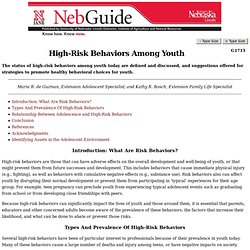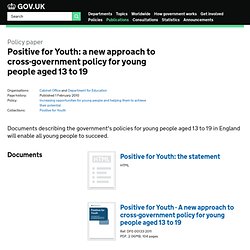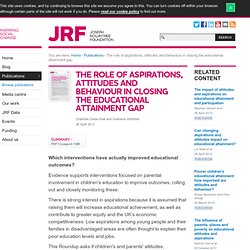

British Youth Council Home Page - BYC. Federation for Detached Youth Work. "Helping to solve problem drug and alcohol use, creating healthier lives and safer communities" Publication: High Risk Behavior Among Youth. The status of high-risk behaviors among youth today are defined and discussed, and suggestions offered for strategies to promote healthy behavioral choices for youth.

Maria R. de Guzman, Extension Adolescent Specialist; and Kathy R. Bosch, Extension Family Life Specialist Introduction: What Are Risk Behaviors? High-risk behaviors are those that can have adverse effects on the overall development and well-being of youth, or that might prevent them from future successes and development. This includes behaviors that cause immediate physical injury (e.g., fighting), as well as behaviors with cumulative negative effects (e.g., substance use). Because high-risk behaviors can significantly impact the lives of youth and those around them, it is essential that parents, educators and other concerned adults become aware of the prevalence of these behaviors, the factors that increase their likelihood, and what can be done to abate or prevent those risks.
Alcohol and young people. Few begrudge them their post-exam blow-out, but what can be done to stop large groups of drunken teenagers turning seaside towns like Newquay into no-go areas?

FRANK. Contents @ the informal education homepage. Positive for Youth - Children and young people. This set of documents describes all of the government’s policies for young people aged 13 to 19 in England within the context of a vision for a society which will enable all young people to succeed.

They set out a new partnership approach for giving young people more opportunities and better support - with young people themselves as influencers and with voluntary and community groups and local businesses drawn in as full partners. A number of the policies covered apply across the United Kingdom, such as those of the Home Office, the Ministry of Justice, the Department for Work and Pensions, and the Ministry of Defence. The government will work with the devolved administrations on areas of shared interest. There has been an extensive period of collaboration and consultation with young people and those who work with them to develop these materials. Further information on Positive for Youth is available from the policy section. Contents @ the informal education homepage. O2 learn - Dr Maths presents: Getting Triggy With It. Community Services Consultancy. Youthwork ethics: Dress for success!
The role of aspirations, attitudes and behaviour in closing the educational attainment gap. Charlotte Carter-Wall and Grahame Whitfield 26 April 2012 Which interventions have actually improved educational outcomes?

Evidence supports interventions focused on parental involvement in children's education to improve outcomes, rolling out and closely monitoring these. There is strong interest in aspirations because it is assumed that raising them will increase educational achievement, as well as contribute to greater equity and the UK’s economic competitiveness. Low aspirations among young people and their families in disadvantaged areas are often thought to explain their poor education levels and jobs. This Roundup asks if children's and parents' attitudes, aspirations and behaviours (AABs) for education really do affect attainment; and whether interventions focused on these can reduce the attainment gap. Rebecca Saxe: How we read each other's minds. Ken Robinson says schools kill creativity.